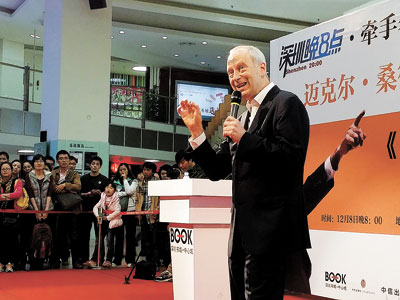
Lin Min
linmin67@126.com
HARVARD University’s Prof. Michael Sandel, whose open class videos have been viewed by millions of people worldwide, virtually turned his meeting with Shenzhen readers into a Harvard class full of heated debate.
Prof. Sandel, one of America’s most famous university professors and public intellectuals, was welcomed by a crowd of hundreds at Shenzhen Book City CBD Store on Sunday night, with a scene of fervent fans that could match those of a pop star’s.
Beloved by a growing number of Chinese readers, especially college students, for his oratorical skills and the ability to involve the audience, the political philosophy professor opened the engagement with Shenzhen readers by inviting them to debate on an issue that troubled Shenzheners 10 years ago: Was it fair for grocers to sell vinegar — believed to be able to ward off the SARS virus at the time — at exorbitant prices when the deadly virus struck in 2003?
Audience members gave their opposing opinions in English, a scene reminiscent of Sandel’s Harvard open classes.
Other topics were also familiar to Shenzhen residents: Is it fair for ticket scalpers to make a profit by reselling concert tickets, train tickets and even appointment tickets with a doctor?
The audience members were also asked to comment on a Chinese woman who tried to sell her hugs to strangers in order to have enough money for an iPad.
As Prof. Sandel said, these questions have no easy answers. The audience members engaged in heated debates that saw no apparent winners. With most in the audience having experienced fighting for a train ticket in order to return to their hometown in time for the Spring Festival, or for an appointment with a doctor, the debates from time to time seemed to go into a stalemate as each side presented equally strong arguments.
“These debates are not easy,” the professor told the audience. “But as we live in a society increasingly dominated by money and markets, we need to debate, because it is the only way to know how we can get the best of the market economy.
“Money and markets are going to pose a challenging ethical issue in the coming years, as we try to find the balance between the benefit of the market and human values, including values higher than money that we care about and cherish.”
As the Chinese Government has decided to let the market play a “decisive” role, questions on the efficiency of the market economy and social justice and fairness will loom large.
“Shenzhen is on the forefront of China’s market economy and in a society where money talks, we need to reflect on what money can’t buy. Such debates are really necessary,” a SunYat-sen University student surnamed Lin said.
At the end of the debate, hundreds of readers sought Prof. Sandel’s autograph for his books, “What Money Can’t Buy,” “Justice: What’s the Right Thing to Do?” and “The Case Against Perfection: Ethics in the Age of Genetic Engineering.”
|

